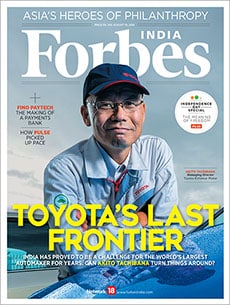
Toyota's compact plan
For the world's largest automaker, a small-car play is crucial for the challenging Indian market
Can the world’s largest automaker be a comparatively less significant player in one of the key markets in the world, one which is now being discussed actively across the boardrooms of the world’s biggest corporations? The answer, it would seem, is obvious. But for Toyota Motor Corporation, India and its 2.8 million unit market have proved to be a challenge for far too long. Sample some numbers: Toyota, ranked 10th in Forbes’s prestigious Global 2000 list of the world’s largest public companies, commands an ordinary 4.61 percent market share, standing at a modest sixth in the pecking order of passenger vehicle makers in India. Rival Japanese major Suzuki’s share? 46.79 percent. A more telling statistic is the fact that Toyota is either totally absent or has a marginal presence in segments like entry level cars, compact cars and compact SUVs which comprise as much as 89 percent of the Indian car market.

It’s no surprise then that Toyota is shaking things up at Toyota Kirloskar Motor (TKM), its India venture, and redrawing a strategy to reach a target of 10 percent market share by 2025. The key to the TKM growth strategy will be the compact- or small-car play. But there’s a catch. Toyota itself is not known for its small cars; so enter Daihatsu Motor, the oldest Japanese car company known for compact cars, where Toyota has recently upped its stake to 100 percent. Daihatsu will be critical to the TKM ambition. And leading this charge will be TKM’s recently-appointed managing director Akito Tachibana, a product planning expert who has had stints in markets like Thailand and Vietnam. As Tachibana tells Deputy Executive Editor N Madhavan, who wrote the cover story for this issue, “I knew India is a very challenging market. Customers here are very demanding and cost-conscious.” Tachibana, of course, will be facing severe headwinds as he puts the new plan in motion, given the huge regulatory upheavals the entire automobiles industry is facing in India on account of restrictions on diesel cars and a strong push towards stricter emission norms. How the new TKM boss navigates these choppy waters will be keenly watched.
Another highlight of this issue is the Forbes Asia listing of the Heroes of Philanthropy, the ninth installment of the finest and inspirational altruists from the region. This list has five of the best from India—Amit and Archana Chandra, Vineet and Anupama Nayar, and Adar Poonawalla. More power to those like them.
Best,
Sourav Majumdar
Editor, Forbes India
Email:sourav.majumdar@network18publishing.com
Twitter id:@TheSouravM
(This story appears in the 30 November, -0001 issue of Forbes India. To visit our Archives, click here.)





